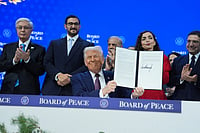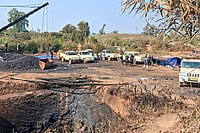A slaughter in Falluja leaves as many as 15 Iraqi anti-occupation protesters dead, including three boys no older than 10, with nervous US forces and enraged townsfolk pointing fingers at each other. A short drive away, even as the bodies are being buried, an American 3rd Infantry Division platoon happily kicks around a football pitch with delighted Iraqi children. One day later US Defence Secretary Donald Rumsfeld steps onto Iraqi soil, beaming as he tells troops at the former Saddam International Airport that "never have so many been so wrong about so much".
Yet, outside downtown Baghdad's Palestine Hotel, it's now routine to see Shi'ite Muslims flex political muscle as they chant in unison for a new Iraq guided by the hand of "Islam, not America". Looming larger still over the centrifuge of contrasting images is the news from Jerusalem, where the long-awaited "roadmap" to solving a half-century history of intractable violence between the Israelis and Palestinians is released. A wary Arab world watches.
Such was the paradox of post-war Iraq in the week that President George W. Bush formally announced victory. For every scene of Iraqi embrace came a chilling sign that no matter how easily the US toppled Saddam Hussein, winning the peace remains a battle barely yet begun. The confluence of conflicting events comes amid deepening anti-US sentiment on the ground, as Iraqis complain their newfound freedom has thus far provided neither jobs nor personal security, essential needs that were hallmarks of life under Saddam.
The firefight at Falluja, a former Ba'athist (and Sunni) stronghold some 50 kilometres west of Baghdad, introduced a new level of tension locally, as mourners on Wednesday insisted the gunfire came against a peaceful protest of unarmed people led by schoolchildren. US forces staunchly denied the accusations, saying the battle was triggered by Iraqi gunmen perched on nearby rooftops. "Which schoolkids carry AK-47s," asked Col Arnold Bray, commander officer of the Ist Battalion, 325 Regiment of the 82nd Airborne Division.
There were no US casualties. Falluja's general hospital said 13 Iraqis died and 75 were injured, with some area residents placing the death toll at 15. The dead and wounded also included women and children shot inside their walled homes.
Coming in a conservative Sunni Muslim community, the Falluja tragedy presents yet another challenge for post-war stability as US combat forces struggle to adapt to the role of peacemakers. Overwhelmingly, the larger challenge remains winning the confidence of Iraq's Shi'ite Muslim majority, among whom the first lungful of freedom has unleashed the yearnings of polity suppressed for decades. This was nowhere more evident than at the holy city of Karbala, where, two weeks ago, as many as 2 million Shi'ites marked a transcendent day of pilgrimage, prayer and penitence known as Arbiin, in memory of the revered Shi'ite saint, Imam Hussein.
Women wept openly on the crowded streets here as groups of male devotees danced and chanted in rituals deemed worthy of the imprisonment of the past 35 years. "This is the real day of liberation in Iraq," said a euphoric Amir Mohsen, 40, a first-time witness to Arbiin. "It's incredible. There is no way to know what freedom is until you put it to the test. Now we know. Today is the first time we can breathe."
Given its sheer scale, Arbiin assumed political dimensions; it amounts to not only the single largest gathering of Iraqis in more than 30 years, but also an unprecedented flexing of Shi'ite muscle. Yet throughout Iraq's Shi'ite centres, such scenes of jubilation provide a cover for undercurrents of factional rivalry as various leading clerics manoeuvre to fill the power vacuum, some with aspirations of an Islamic revolution.
In strife-torn Najaf, the theological seat of Shi'ite Islam, deep frustration has set in over the continuing absence of electricity and water. Religious infighting has already cost the lives of two wellknown clerics in grisly killings last month—one of them was a US-backed resistance figure just back in Iraq after years in exile. For the time being, Najaf is governed—barely—by the hawza, the influential clerical establishment based at the Shrine of Ali. The factions struggling for leadership of Shi'ite influence have struck an uneasy truce. And there are no signs of US soldiers.
In separate interviews, two of Najaf's leading clerics spoke in tones of hopeful moderation, all the while casting subtle aspersions on Iraqi National Congress leader Ahmed Chalabi. "We are doing what we can because now there is no law, no control, and many guns on the streets," said a composed Syed Mohammed Reda al-Sistani, son of Iraq's most senior Shi'ite cleric, Ayatollah Ali al-Sistani. "Our role is to advise the people on how to try for a normal and secure life. But in the end, what we hope for is a democracy where decisions are made by small groups locally—leaders of tribes and businessmen. Religious men must watch them from afar to avoid problems."
Syed Riyad al-Nouri, with ties to the more militant Sadr family of clerics, too spoke overtly only of a secular government. "What America destroyed, America must rebuild. This is what we tell people who are angry at the US," he said. "The religious people should be away from the government. We don't want Iraq divided anymore."
Of greater concern to planners from the United States are the machinations of the Iranian-based Supreme Council of the Islamic Revolution in Iraq (SCIRI), which is actively deploying throughout Iraq, especially in the towns and cities nearest to the border. sciri's arrival in Kut and Baquba, residents of both cities say, was preceded by those from the sect's armed wing, the 10,000-strong Al-Badr Brigade. Within days, mayors with pro-sciri leanings were installed in both cities.
After a two-week standoff, US Marines moved on Kut last week, bloodlessly displacing the upstart government amid warnings from Washington that no authority but that of America will be tolerated in the interim post-war period. Such a standoff has yet to occur in Baquba, a city of 400,000 people 60 km northeast of Baghdad, where US forces have yet to deploy in significant numbers. Through it all, the Pentagon continues to clearly favour the controversial Chalabi as its candidate to lead a reconstructed Iraq. He has established a Baghdad headquarters in the tony neighbourhood of Al-Mansour under the protection of US Special Forces and a platoon from his pretentious Free Iraqi Forces.
But in Mansour, as in the rest of Iraq, it's obvious that Chalabi's candidacy is a non-starter, dismissed by all as made-in-America. The sentiment was violently underscored as Chalabi arrived in Baghdad, when the truck of a loyalist bearing his photo on its windows took gunfire as it cruised through city streets here. "I am one of the tribe of Chalabi," the panicked driver blurted helplessly to reporters as he spilled out of the vehicle in front of Chalabi's headquarters with blood trickling down his neck from flying glass fragments. It was a grim reminder of what the US could still face.
Never So Wrong
A Sunni massacre, restive Shi'ites—the US roadmap gets some grim reminders Updates

Never So Wrong
Never So Wrong
Published At:
MOST POPULAR
WATCH
MORE FROM THE AUTHOR
×




















